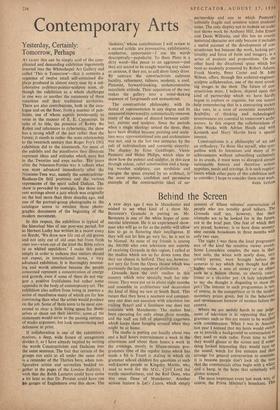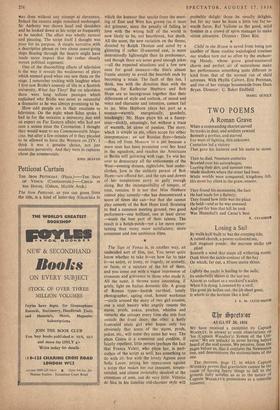Behind t he Screen
A FEW days ago I was in Manchester and wished to see what kind of a show Mr. Bernstein's Granada is putting on. Mr. Bernstein is one of the white hopes of com- mercial television. He is an experienced show- man who will go as far as the public will allow him to go in flattering their intelligence. If they will not let him go very far, he is not to be blamed. As none of my friends is among the 300,000 who own television sets capable of receiving Granada in this region, I called at the studios which are so far down town that they are almost in Salford. They are, however. not very far from the Opera House which was previously the last outpost of civilisation.
Granada have the only studios in this country which were specially, built for tele- vision. They were put up in about eight months and resemble in architecture and decoration the kind of thing we saw at South Bank. This means that they have a neatness and compact- ness one does not associate with television (no trailing flexes) and a liveliness one does not associate with Manchester. The station has been operating for only about three months, and the staff are full of pioneering eagerness which keeps them hanging around when they might be at home.
The studio is putting out locally about ,two and a half hours entertainment a week in the afternoons and about three hours a week in the evenings, mostly in fifteen-minute pro- grammes. One of the regular items which has made a hit is Youth is Asking in which six grammar school children fire questions at such well-known people as Kingsley Martin, who used to work for the M.G ., Cyril Lord the textile manufacturer, and the Red Dean, who was once Dean of Manchester. Another serious feature is Let's Listen, which simply
consists of fifteen minutes' conversation of people who are notably good talkers. The Granada staff say, however, that their triumphs are to be looked for in the future, not in the brief past. One feat of which they are proud, however, is to have done seventy' nine outside broadcasts in three months with only two vans.
The night I was there the local programMe was of the kind the sensitive viewer avoids. Some Lancashire couples, the men in their best suits, the wives with newly done, very crinkly perms, were brought before the cameras to say which they thought had the higher value, a sum of money or an object such as a Stilton cheese, an electric rotary ironer or a chamber pot. (A lady telephoned to say she thought it disgusting to show the pot.) The interest in such programmes is not, of course, in the competition or in the modest monetary prizes given, but in the behaviour and spontaneous humour of novices before the camera.
Where we are unduly harsh in our judge' ment of television is in supposing that pro' grammes such as this are meant to be watched with concentration. When I was in Americo last year I noticed that my hosts would switch on to provide a background to conversation as they used to with radio. From time to time they would glance at the screen and if some' thing looked interesting they would turn UP the sound, watch for five minutes and then arrange for general conversation to continue. It is because people don't look all the time that the commercials often begin with a whiii and a bang, in the hope that somebody Will glance around.
The most important event last week was, of course, the Prime Minister's broadcast. This was done without any attempt at cleverness. Indeed the camera angle remained unchanged. Sir Anthony was shown head and shoulders and he looked down at his script as frequently as he needed. The effect was wholly natural and pleasing. The script itself I thought was poor for its purpose. A simple narrative with a descriptive phrase or two about ocean-going ships floating through the deserts might have made more impact that the rather closely woven political argument.
One of the discomfiting effects of television is the way it reveals the weaknesses of plays which seemed good when one saw them on the stage. I remember rocking with laughter when I first saw Bridie's comedy of life in a Scottish university, What Say They? But on television there were long tedious passages which explained why Bridie was never as successful a dramatist as he was always promising to be.
How odd people are in their reactions to television. On the night when Eden spoke had in for the occasion a university don and an expert on Far Eastern affairs who had not seen a screen since the Coronation. I thought they would want to see Commonwealth Maga- zine, but after a few minutes of it they pleaded to be allowed to have the Western on ITV. 1 think it was a genuine choice, not just academic perversity. And they were in raptures about the commercials.
JOHN BEAVAN



































 Previous page
Previous page